Edie Melson's Blog, page 219
November 20, 2019
Connect with Readers through Closed Facebook Groups

by Susan U. Neal RN, MBA, MHS @SusanNealYoga
Would you like to develop relationships with your readers? You can through closed Facebook groups. Many writers have created Facebook author pages, but in a closed group, only group members can see the posts. The focus of these groups is about how the author can benefit the reader who chooses to join the group. Think of it as a Bible study in your home. You are the host who offers valuable content. During the study a relationship develops between members as you get to know one another. Facebook groups can be mutually beneficial for the reader and the author. Reader BenefitAlways provide members with relevant information—entertain or assist. For example, in my closed Facebook group, How to Sell 1000 Books in Three Months, I post active leads for bloggers, podcasters, and radio show hosts seeking interviewees. I also post pertinent marketing articles and blogs. I’m available to answer questions, but more than that, I push the follower to expand their boundaries. I ask if they’ve created their six-month marketing plan yet and offer to read it and provide feedback. I want to serve my customers. This group is part of my course, How to Sell 1000 Books in Three Months, offered by Serious Writer Academy.
I created a second closed Facebook group for a different segment of my readership. In the 7 Steps to Get Off Sugar and Carbohydrates group, people ask all sorts of questions regarding health, nutrition, and how to change their eating habits. I thoroughly enjoy engaging with my audience and providing them with the support they need to make difficult lifestyle changes. The camaraderie in the group is commendable. If I am not available to immediately answer a member’s post, other members respond and offer support. When someone shares a difficult time, we encourage and pray for each other. The connections are heartfelt. Anyone is welcome to join this group.
If you allow anyone to join your group whether they purchased your book or course, the participant may choose to buy your product later, if they find value from the group. Edie Melson coordinates a client-focused group, Soulful Ink. Anyone is welcome to join. She cultivates creativity, encouragement, and soul nourishment in this community.
Author Benefit
Groups benefit the author as well. I’ve expanded my number of followers on my personal Facebook profile by friending individuals who join my group. You could require the follower to provide their email address before they enter the group by using a landing page connected to your email subscriber list.
One of the most important benefits is that you gain loyal followers who trust you because you are answering their questions and providing them with beneficial information. Recently for my newest book, Solving the Gluten Puzzle , I asked my 7 Steps group if anyone would like to join my book’s launch team. I had dozens sign up.
When you have a new book or product, you can easily let your followers know about it. Recently I wrote a post about how changing habits take sixty-three days not twenty-one. I explained that you want to change your subconscious mind which is your belief system. To do this a member of the group was listening to the Audible version of my book, 7 Steps to Get Off Sugar and Carbohydrates . Listening helped change her mindset which made it easier for her to stay away from unhealthy foods. That month I sold 225 Audible books!
SummaryHow do readers find your Facebook group? You place a link to the group on your website, Amazon author page, and at the beginning or end of your book. Add information about the group to the bio section of your articles and blogs. Connect the group to your author Facebook page, and invite followers from this page.
A closed Facebook group provides your reader with direct access to you. Groups can be powerful as the reader gets to know you and how you can benefit them. Closed Facebook groups are beneficial for all involved.
TWEETABLE
Connect with Readers through Closed Facebook Groups - tips from @SusanNealYoga on @EdieMelson (Click to Tweet)
 Susan U. Neal, RN, MBA, MHSSusan’s mission is to improve the health of the body of Christ. She has her RN and MBA degrees, as well as a master’s in health science. She is a CERTIFIED HEALTH AND WELLNESS COACH with the American Association of Christian Counselors. She published five books, the Selah award winner
7 STEPS TO GET OFF SUGAR AND CARBOHYDRATES
,
CHRISTIAN STUDY GUIDE FOR 7 STEPS TO GET OFF SUGAR AND CARBOHYDRATES
, HEALTHY LIVING JOURNAL, SCRIPTURE YOGA a #1 Amazon best-selling yoga book, and
YOGA FOR BEGINNERS
which ranked #3. She published two sets of Christian Yoga Card Decks and two Christian Yoga DVDs that are available at CHRISTINAYOGA.COM. Her digital product
HOW TO PREVENT, IMPROVE, AND REVERSE ALZHEIMER’S AND DEMENTIA
is a great resource. To learn more about Susan visit her website SUSANUNEAL.COM You can also connect with Susan on FACEBOOK, TWITTER, and INSTAGRAM.
Susan U. Neal, RN, MBA, MHSSusan’s mission is to improve the health of the body of Christ. She has her RN and MBA degrees, as well as a master’s in health science. She is a CERTIFIED HEALTH AND WELLNESS COACH with the American Association of Christian Counselors. She published five books, the Selah award winner
7 STEPS TO GET OFF SUGAR AND CARBOHYDRATES
,
CHRISTIAN STUDY GUIDE FOR 7 STEPS TO GET OFF SUGAR AND CARBOHYDRATES
, HEALTHY LIVING JOURNAL, SCRIPTURE YOGA a #1 Amazon best-selling yoga book, and
YOGA FOR BEGINNERS
which ranked #3. She published two sets of Christian Yoga Card Decks and two Christian Yoga DVDs that are available at CHRISTINAYOGA.COM. Her digital product
HOW TO PREVENT, IMPROVE, AND REVERSE ALZHEIMER’S AND DEMENTIA
is a great resource. To learn more about Susan visit her website SUSANUNEAL.COM You can also connect with Susan on FACEBOOK, TWITTER, and INSTAGRAM.
Published on November 20, 2019 22:00
November 19, 2019
Are You a Good Recruiter of Words?

by Katy Kauffman @KatyKauffman28
It matters the words we choose. Stir up or incite? Weaken or languish? Move or sway? When you consider which word to write next, do you also consider the power behind the word? How it sounds to the reader’s inner ear? What picture it portrays? You are more than just a writer of words—you are a recruiter as well.
Our words are our allies. They prove our point, illustrate our thoughts, and fight our battles. Are you seeking to vanquish hopelessness in the minds of your readers? Choose your words carefully. Are you illustrating a story of redemption and second chances? Pick your allies wisely.
A limp word fights against your purposes, acting as a weak soldier in your ranks. Not every word needs to wear shiny armor, but your army of paragraphs and sentences should be filled with vivid nouns and verbs that relay your message and fight against the evils and lies of this world. They should engrave truth, strength, and hope onto the souls of your readers. How effective is your army?
Another Ally
Rarely does a first draft pop out of our minds filled with just the right words. Using a red pen (or another color) helps us to identify any weak points in our writing and reinforces our chances of being published and making an impact on the readers’ minds and hearts.
If a red pen looks more like an enemy than a friend, it’s okay to pick another color. Once you’ve written a first draft, read your writing and use a colored pen or pencil to circle any words in your paragraphs that appear limp instead of battle ready. To the side of that line of words, jot down some alternative “soldiers,” words that better illustrate what you want to say or convey a stronger feeling you want the reader to experience.
Becoming Battle Ready
If you’re like me and you reach a point in your writing where you just don’t know what words to use, check out some books or articles by other “generals.” Read your favorite authors, and see what words they recruited to capture the readers’ attention, prove their points, and etch a lasting impression on their readers’ hearts.
Don’t let vivid nouns and verbs take position in only your titles and first lines. Position them throughout your paragraphs to maintain the power behind your words, either helping the reader to fly through a page or causing them to slow down and contemplate your writing.
One last thing. I’ve found it’s never best to fight alone. I treasure the writer friends who have helped my words become more battle ready. Ask another recruiter to size up the power and punch of your words, and take to heart any helpful feedback that is given. Recruit the nouns and verbs that deliver just the right touch or the perfect punch.
What strategies do you use in picking just the right words? Share your thoughts in the comments below, and happy recruiting. One vivid word after another.
TWEETABLEAre You a Good Recruiter of Words? @KatyKauffman28 on @EdieMelson (Click to Tweet)
 Katy Kauffman is an award-winning author, an editor of
Refresh Bible Study Magazine
, and a co-founder of Lighthouse Bible Studies. She loves connecting with writers and working alongside them in compilations. Her compilation, Heart Renovation: A Construction Guide to Godly Character, was a 2019 Selah Awards finalist and Director’s Choice finalist. Katy’s writing can be found at CBN.com, thoughts-about-God.com, the Arise Daily blog, PursueMagazine.net, and two blogs on writing. She loves spending time with family and friends, making jewelry, and hunting for the best donuts. Connect with her at her blog,
The Scrapbooked Bible Study
, and on Facebook and Twitter.
Katy Kauffman is an award-winning author, an editor of
Refresh Bible Study Magazine
, and a co-founder of Lighthouse Bible Studies. She loves connecting with writers and working alongside them in compilations. Her compilation, Heart Renovation: A Construction Guide to Godly Character, was a 2019 Selah Awards finalist and Director’s Choice finalist. Katy’s writing can be found at CBN.com, thoughts-about-God.com, the Arise Daily blog, PursueMagazine.net, and two blogs on writing. She loves spending time with family and friends, making jewelry, and hunting for the best donuts. Connect with her at her blog,
The Scrapbooked Bible Study
, and on Facebook and Twitter.
Published on November 19, 2019 22:00
November 18, 2019
Are You a Humble Writer?

by Lucinda Secrest McDowell @LucindaSMcDowel
The voice at the other end of the phone was ecstatic, “I love your book—it’s so deep, so insightful! I don’t understand why you aren’t more famous as an author. In fact, you should have been the keynote speaker, not just a seminar leader at that conference. You are an amazing writer! Why haven’t I ever heard of your books before?”I meet so many people when I speak at conferences, and it’s always gratifying to hear that my words have been received. Obviously, this unexpected phone call tickled my ears—tempting me to see this young author as my new BFF.
I lapped up the praise, answered her questions, and after hanging up sat very still.
Ashamed that her words echoed my own unspoken thoughts. Why haven’t more people heard of my books? Why am I not the keynote speaker at more events? What real impact has my ministry made throughout the years?
Writing and speaking encouraging words based on God’s Word has been my passion for a lifetime. An obedient response to a definite calling, I walk through the open doors and offer my best, empowered by the Spirit. Always leaving the fruit up to God. And I truly do believe I have been used for kingdom work in people’s lives.
Is it so wrong for my heart to wish it were more?
While you may not be a writer and speaker, chances are you too occasionally struggle with seeing the fruit of your own labor. We envision our legacy as one thing, only to discover God has a totally different plan. We can still practice humility, not by wanting less but by wanting more for God’s glory.
King David thought his life’s crowning glory would be to build the Temple. He cast the vision, created the blueprint, gathered equipment, assembled a skilled team, and laid the foundation. How he must have reeled from the news that God had instead chosen his son, Solomon, to complete it. All that work—all that wisdom and knowledge of a lifetime—and someone else would be the one to yield the glory!
Solomon quickly affirmed his father’s role by reminding the people the Lord had said to David, “You wanted to build the Temple to honor my name. Your intention is good” (2 Chronicles 6:8).
David’s dream was a good thing. Releasing it to another (as God instructed) was even better.
I was reminded of the words my friend Christin Ditchfield shared—words that penetrated my heart deeply, causing me to weep silently: “Some of us are called to prepare the way, to blaze the trail for those who come after us and whose progress will far exceed our own. They will stand on our shoulders, just as we have stood on the shoulders of those who came before us.”
Is it enough to be the trailblazer? To be the one who invests in those who will far surpass my own work? To relinquish the accolades to another?
Absolutely. Of course. In fact, this is my passion—equipping and empowering others to go forth. Beyond me.
Will you also choose the path of humility, whatever that means in your life?
Pray with me the closing words of a favorite hundred-year-old prayer, “Litany of Humility”:That others may be loved more than I, Jesus, grant me the grace to desire it.That others may be esteemed more than I, Jesus, grant me the grace to desire it.That in the opinion of the world, others may increase and I may decrease, Jesus, grant me the grace to desire it. . . .That others may become holier than I, provided that I may become as holy as I should, Jesus, grant me the grace to desire it. —Cardinal Raphael Merry del Val So humble yourselves under the mighty power of God, and at the right time he will lift you up in honor.—1 Peter 5:6
©2019 Lucinda Secrest McDowell, adapted from “Life-Giving Choices”
TWEETABLEAre You a Humble Writer? Thoughts from @LucindaSMcDowel on @EdieMelson (Click to Tweet)
 Lucinda Secrest McDowell, M.T.S., is a storyteller and seasoned mentor who engages both heart and mind while
“Helping you Choose a Life of Serenity & Strength.”
A graduate of Gordon-Conwell Theological Seminary and Furman University, McDowell is the author of 15 books and contributing author to 30+ books. Her award-winning books include
LIFE-GIVING CHOICES
,
SOUL STRONG
(2020),
DWELLING PLACES
(2017 Christian Retailing BEST Award for Devotional),
ORDINARY GRACES
(2018 Selah Finalist),
LIVE THESE WORDS
, and
Refresh!
Lucinda, a member of the REDBUD WRITERS GUILD, received Mt. Hermon “Writer of the Year” award and guest blogs for The Write Conversation, Blue Ridge Mountains Christian Writers Conference Blog and (in)courage. Whether co-directing
“RENEW ~ RETREAT FOR NEW ENGLAND WRITING,”
pouring into young mamas, or leading a restorative day of prayer, she is energized by investing in people of all ages. Lucinda’s favorites include tea parties, good books, laughing friends, ancient prayers, country music, cozy quilts, musical theatre, and especially her family scattered around the world doing amazing things. Known for her ability to convey deep truth in practical and winsome ways, she writes from “Sunnyside” cottage in New England and blogs weekly at
https://lucindasecrestmcdowell.com/
Follow Lucinda on Twitter: @LUCINDASMCDOWEL
Lucinda Secrest McDowell, M.T.S., is a storyteller and seasoned mentor who engages both heart and mind while
“Helping you Choose a Life of Serenity & Strength.”
A graduate of Gordon-Conwell Theological Seminary and Furman University, McDowell is the author of 15 books and contributing author to 30+ books. Her award-winning books include
LIFE-GIVING CHOICES
,
SOUL STRONG
(2020),
DWELLING PLACES
(2017 Christian Retailing BEST Award for Devotional),
ORDINARY GRACES
(2018 Selah Finalist),
LIVE THESE WORDS
, and
Refresh!
Lucinda, a member of the REDBUD WRITERS GUILD, received Mt. Hermon “Writer of the Year” award and guest blogs for The Write Conversation, Blue Ridge Mountains Christian Writers Conference Blog and (in)courage. Whether co-directing
“RENEW ~ RETREAT FOR NEW ENGLAND WRITING,”
pouring into young mamas, or leading a restorative day of prayer, she is energized by investing in people of all ages. Lucinda’s favorites include tea parties, good books, laughing friends, ancient prayers, country music, cozy quilts, musical theatre, and especially her family scattered around the world doing amazing things. Known for her ability to convey deep truth in practical and winsome ways, she writes from “Sunnyside” cottage in New England and blogs weekly at
https://lucindasecrestmcdowell.com/
Follow Lucinda on Twitter: @LUCINDASMCDOWEL
Published on November 18, 2019 22:00
November 17, 2019
Time Management for Authors is Cyclical & Varies By Season
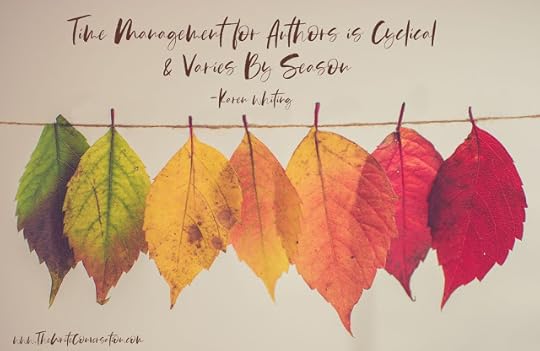
by Karen Whiting @KarenHWhiting
Authors manage more than writing. We really have seasons throughout cycle of creating and launching books. In certain time periods, we focus on one aspect more than another.Spring: Seeds of IdeasIn spring farmers plant chooses the seeds to plant. A writer’s spring starts with new ideas, the seeds. You consider the possibilities of each idea. As one concept or story plot excites you, harness the energy. Brainstorm the reasons that book is needed, the reader benefits, and where it should be marketed. Decide the main focus for your ideal reader: entertainment, education, or scape to another world. Use this information to write the proposal plus a few chapters and map out the book.
In spring, the farmer figures out when the produce should be ripe for harvest as well as future tasks to do and when. That means understanding productivity. For writers, figure out how long it will take to write and market the book. You can move into the summer season when there’s a contract or to you plan the timeline for writing and publishing it yourself.
Winter Blahs for WritersWinter blizzards can come unexpectedly. A proposal sits dormant (uncontracted), you encounter a writing or publishing block where you don’t know the next step, or life interferes. The wait seems endless. Get through those times by revisiting the need for the book and reader benefits. Add more ideas for the book and marketing.
Summer: Season of GrowthThis is the main writing season of writing. As you write, make notes during breaks for marketing such as pullout quotes, speaking props to illustrate a point, swag to create, and reader benefits. Create promotion files Write blog post or social media prompts, list chapter talking points, note possible memes to create, and add reader solutions offered. This prepares for harvest, the prime marketing time.
As the manuscript lengthens, it needs weeding and pruning. This late part of summer is the editing time. As you edit, think of the images the words conjure up and grab some free photos to create memes. List what reader needs you addressed, what groups might want to hear you speak, etc. This continues the marketing preparations.
Autumn and Harvesting: Marketing TimeAfter a book is contracted and editing completed, the harvest season approaches as the book goes into the production phase. You need to be ready to feed the hungry people when the book is ripe (published). This means moving from focusing on writing to concentrate more on marketing. If you shrink when you think of promotion, go back to the files from spring and post the reasons the reader needs the book and the benefits. Read that each day as a motivation to focus on marketing. Remember that you’ve already created great files of ideas to develop for marketing. This makes it much easier. Choose one of those files and start working on the ideas.
Just as you dream of opening the package with the first copies of the book and feel joy and anticipate helping readers, share that joy. That’s the essential marketing motivation. Get busy posting about the book, doing interviews, and promoting your speaking to share your book. Sine you enjoy writing, use those skills in crafting posts and articles. Use all the marketing lists to create great promotional materials. Write tip sheets and other freebies to give readers. Script a video clip and do that on FB live or simply as a video. Most of all, use the ideal reader notes ad needs to talk to your reader and share how you understand the needs and have solutions.
As the marketing gets underway and the book launches, watch for new seeds (ideas) that God wants you to plant. That will move you to a new season of spring for the cycle to begin again. If winter arrives as marketing wanes, pray about your next project. Read your last list of reader needs and think about what else your reader needs. Listen to reader feedback to identify what else they might want. As a new spring comes you still need to keep a little time for the marketing of the previous book. Set aside one weekly block of time for that.
Mixed SeasonsSometimes seasons seem to mix, like a hot winter day. We have that in writing like with a new project just as a book releases. That’s when we have to manage our time differently by scheduling blocks of time for various tasks. One activity or another may seem more attractive, but all need tending. For me, my 4-way to do list is my biggest tool. I draw a big cross on a piece of paper to make four sections. Each section is one focus: writing, marketing, personal/family, and volunteer/activities. That helps me focus on one area at a time.
Transition from one season to the next by celebrating the ending of each and thanking God for the blessings of the new one. Keep the cycle going with fresh ideas and paying attention to each season in its time.
As you sprinkle news of what you’re doing in social media throughout the year, note people who get excited and invite them to your launch team. Ask them to pray as you write. You’ll grow your tribe for the next book cycle.
TWEETABLE
Time Management for Authors is Cyclical & Varies By Season - @KarenHWhiting on @EdieMelson (Click to Tweet)
 Karen Whiting (www.karenwhiting.com) is an international speaker, former television host of Puppets on Parade, certified writing and marketing coach, and award-winning author of twenty-six books for women, children, and families. Her newest book, 52 Weekly Devotions for Families Called to Serve, uses stories, activities, and chat prompts to help families develop servant hearts and foster strong bonds in families who have members serving the community, nation, or world.
Karen Whiting (www.karenwhiting.com) is an international speaker, former television host of Puppets on Parade, certified writing and marketing coach, and award-winning author of twenty-six books for women, children, and families. Her newest book, 52 Weekly Devotions for Families Called to Serve, uses stories, activities, and chat prompts to help families develop servant hearts and foster strong bonds in families who have members serving the community, nation, or world.She has a heart to grow tomorrow’s wholesome families today. She has written more than seven hundred articles for more than sixty publications and loves to let creativity splash over the pages of what she writes. She writes for Leading Hearts and Crosswalk.com. Connect with Karen on Twitter @KarenHWhiting, Pinterest KarenWhiting, and FB KarenHWhiting
Published on November 17, 2019 22:00
November 16, 2019
Writers as Harvesters of Righteousness

by Tammy Karasek @TickledPinkTam
When I hear the word harvest, I immediately think of gathering something. In my mind, I see the farmers gathering up the fruits of their labor that have ripened. During this time of year near where I used to live in Ohio, farmers have gathered their grain to store up for the winter to come. The corn is in the silo, ready to feed the animals through the long cold season.
“And a harvest of righteousness is sown in peace by those who make peace.” (James 3:18 ESV)
A harvest of righteousness. This expression made me pause. I wondered about the deeper meaning of it and wanted to understand it more clearly so I dug further, looking up the various definitions of both harvest and righteous. Harvest – to gain, win, acquire, or use; the result of an act.Righteous – acting in an upright, moral way, virtuous.
Now as I read the scripture, it meant something different. If I changed the wording a little (not changing the meaning), it taught me that we have a responsibility of harvesting righteousness. Hear me out …
A harvest (or gain, acquiring) of righteousness (by acting in an upright, moral or virtuous way) is sown in peace by those who make peace.
This made me think about how we treat others. If you watch the nightly news, we aren’t doing so well with this of late. But I believe we need to look at our own reflection, too. Do we act righteously? Do we try to make peace? Or are we quick to critique others, or even attack them for their differences? Judgmental maybe?
As we head into this holiday season, the hustle and bustle of this time of year can sometimes raise our stress levels. More realistically, it does raise them! We can become impatient, critical or snarky . . . anyone relate? Please tell me it’s not just me.
If we want others to treat us well, we need to do the same. When we do our best to make peace, I believe more peace will be seen in our surroundings. In other words, if you want more peace, you can gather or harvest it by sowing peace to those you have an opportunity to be with.
Writers have an excellent opportunity to write encouragement and words of peace anytime we put something down in print. At the holidays should be no different. If anything, we should look for more ways to lift those around us with words of cheer, encouragement to their tired souls and bring ‘em a bit of Jesus in everything we write.
Might I suggest that as we head into this wonderful time of year, we all strive to be harvesters of righteousness? That we make (and keep) peace with those we encounter by acting in an upright, moral or virtuous way each day.
And yes, even with that cranky aunt you might get stuck sitting beside at the Thanksgiving table this year!
Will you set out to be a harvester of righteousness with me?
TWEETABLEWriters as Harvesters of Righteousness - @TickledPinkTam on @EdieMelson (Click to Tweet)
 You’ll find Tammy seeing humor and causing laughter in every aspect of life. Her past, filled with bullying and criticism from family, is the driving force of her passion to always encourage others and give them The Reason to smile. She’s been married to her college sweetheart, Larry, for 37 years, a mom to their grown daughter, Kristen, and wrapped around the paw of a little dog named Hattie. Born and raised in Ohio, her family now resides in South Carolina. She is the President of Word Weavers Upstate SC, member of ACFW and My Book Therapy/Novel Academy. She’s the Blog Editor for Word Weavers International. A Conference Assistant for Blue Ridge Christian Writers Conference. A monthly contributor for The Write Conversation. A contributor in the 2018 Divine Moments Compilation Book—Cool-inary Moments. Also a regular contributor to several other blogs.
You’ll find Tammy seeing humor and causing laughter in every aspect of life. Her past, filled with bullying and criticism from family, is the driving force of her passion to always encourage others and give them The Reason to smile. She’s been married to her college sweetheart, Larry, for 37 years, a mom to their grown daughter, Kristen, and wrapped around the paw of a little dog named Hattie. Born and raised in Ohio, her family now resides in South Carolina. She is the President of Word Weavers Upstate SC, member of ACFW and My Book Therapy/Novel Academy. She’s the Blog Editor for Word Weavers International. A Conference Assistant for Blue Ridge Christian Writers Conference. A monthly contributor for The Write Conversation. A contributor in the 2018 Divine Moments Compilation Book—Cool-inary Moments. Also a regular contributor to several other blogs. Connect with Tammy: Blog: http://www.tammykarasek.com Email: tickledpinktammy@gmail.com
Published on November 16, 2019 22:00
November 15, 2019
Lost Yesterdays as God Equips Us to Write
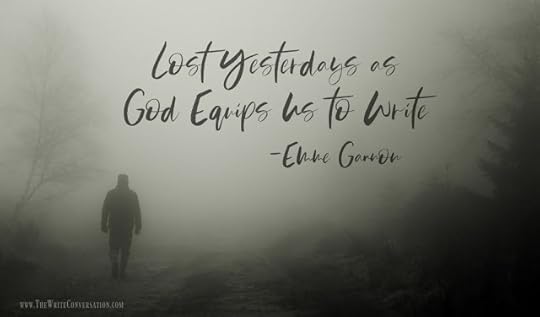
by Emme Gannon @GannonEmme
Love once blended with another. As one. Now fading as the mist of dawn. Dreams once pursued now silent. Like the still of a moonless night. Such is the exploding emotions when dreams fade.Karen Blixen, who wrote by the pen name of Isak Dinesen, started her poignant biography, Out of Africa with, “I had a farm in Africa at the foot of the Ngong Hills.” She went on to passionately describe scenes that had fixed themselves in her heart and mind during the seventeen years of her life there. The day came when it was time to pack up the life she’d known and loved, store it in her heart, and move away. In saying goodbye to Africa, she penned, “If I know a song of Africa, I thought of the giraffe, and the African new moon lying on her back, of the ploughs in the fields, and the sweaty faces of the coffee-pickers. Does Africa know a song of me?” She never returned but her book, Out of Africa, forever sings her love song of when she had a farm “at the foot of the Ngong Hills.”
Saying goodbye to a dream tears at your heart as you reel from the impact of hard choices. When circumstances dictated that I put my husband in Memory Care, I knew his faint knowledge of me would dwindle even more as the disease progressed. As he gazes at me with lost eyes, I remind him of his two tours of duty in Vietnam as a search and rescue helicopter pilot. I point out all of the lives he saved and the American dead he risked his life to rescue from enemy territory and the families that now have a grave to visit on U.S. soil because of his sacrifice. I tell him about the business we started and ran for over thirty years. One built on honesty and integrity. I tell him what an honorable man he is and of his love and commitment to our marriage and family. I remember for him.
I’m not angry at God. I’m not angry at Agent Orange that dripped from the jungle vines as he navigated his helicopter into tiny openings in enemy territory. God is sovereign. My son recently reminded me that one cannot mourn the past, only rejoice in the many gifts it gives. So, through my tears, I write so that others will have hope as they bridge the gap between closure of one dream and the beginning of another. I illustrate my struggles in story. With happy endings, because a happy ending is what we’re made for. It’s what Jesus came for. It’s what we’ll one day experience in heaven.
Karen Blixen’s dream of a life in Africa had permeated her soul. As the African sun sank below the horizon and burned the sky warm with yellow, red, pink, and orange, she and her farm workers would often sit around the campfire. “Please, Memsahib, talk to us like the rain,” they’d say, describing her storytelling. This lilting rhythmic style that she developed while storytelling carried on into her writing. If we allow, lost dreams will blend into the mosaic of our lives, and breathe new life into our tomorrows.
God never misses an opportunity to use closed doors to nurture our calling. Just answer the call, no matter where it takes you. No matter how unpopular. Be bold and say what you’re meant to say. Do what you’re meant to do. Be a brave soldier. Know that God has equipped you with the words that only you can write. The message only you can bring. The story only you can tell, for partial obedience is disobedience. Dance until the music stops. God’s dream for us will be fulfilled. If not in this life, in eternity, where we were born to reign with Christ forever.
We’re not to live in the past, but if lessons are learned well, the past can weave into our todays and tomorrows and bring both wisdom and memories of a life well lived. We’ll see how God knew that we’d need the joy of yesterday to bring a smile to today. Sometimes through tears, but a smile just the same. Looking back, we’ll remember that we braved the odds and experienced that spiritual place on earth that is only available in union with God. Letting go isn’t failure but, instead, is trusting God for tomorrow—one where visions are not as clear and the advantages do not seem great. We are embarking on new territory, still seen through a vapor but one day will be as clear as the Carolina sky on a cloudless day.
TWEETABLELost yesterdays as God Equips Us to Write - from @GannonEmme on @EdieMelson (Click to Tweet)
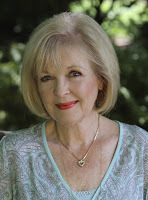 Emme Gannon is a wife, mother, and grandmother who loves to write stories that stir the heart. Her award-winning writing has appeared in Focus on the Family magazine, several anthologies, and numerous newsletters. She just completed her first novel.
Emme Gannon is a wife, mother, and grandmother who loves to write stories that stir the heart. Her award-winning writing has appeared in Focus on the Family magazine, several anthologies, and numerous newsletters. She just completed her first novel.
Published on November 15, 2019 22:00
November 14, 2019
10 Attitudes Every Writer Must Avoid

by Edie Melson @EdieMelson
We read a lot about what it takes to become a writer. We talk about craft, practice, networking.
But one thing we often neglect is girding our minds for the journey to publication.
Today I’m sharing some of the things we need to guard against in our minds and hearts if we’re truly serious about achieving our dreams.Attitudes of an Ineffective Writer1. Waiting too long to get started. I talk to writers—and wanna-be-writers—every day who are drowning in the reasons they’re not writing. They are postponing until everything in life is just right. Unfortunately, they don’t see the delay as the excuse it is. We all have “reasons” not to write. But the bottom line doesn’t change. Writers write.
2. Refusing to be patient. Yes, it’s bad to put off beginning, but we shouldn’t go into this expecting instant results. There’s a lot to learn to become a writer. There’s no timetable. It takes as long as it takes. As long as we’re learning and growing, we’re doing well.
3. Comparing ourselves to others. There will always be people who appear to have it easier. But none of us knows what’s gone before. I need to focus on my own journey. Comparisons lead to dissatisfaction and unrealistic expectations.
4. Trying to do too much at once. Multitasking is a lie. Yes, we can have several projects going in the same timeframe, but we cannot work on them simultaneously. Part of learning to become a writer involves learning the art of setting priorities.
5. Refusing to change.Instead of growing and adapting, this mindset expects the publishing world to adapt to them.
6. Always expecting to be the exception. There are two ways things happen in the writing world—the normal way and the exception. It’s called an exception because it doesn’t happen often. Common sense needs to remind us that we cannot expect to live our publishing life as the exception.
7. Forgetting the reason we started writing. The reason why can get us through almost any obstacle. When we forget why, the resilience we had slips through our fingers.
8. Focusing on the negative. Just like anywhere else, in publishing disappointments will come. We can choose to live in the negative, complaining and whining, or we can learn from the struggle and move forward.
9. Waiting for perfection.Being patient is good. Expecting to someday be perfect is a pipedream. I write better today than yesterday, and I’ll write even better tomorrow. We do the best we’re capable of and keep moving. Perfection is a sinkhole that leads to nothing but defeat and failure.
10. Ignoring the spiritual component of the journey. God is part of this writing journey. The words He has for us to share have more purpose than to just bring us fame and fortune. Sometimes that purpose seems small and insignificant, but it’s not. When God moves us, miracles happen, even if we never see them.
I believe these are the top ten mind battles we must face to find joy and fulfillment as a writer. What would you add to the list?
Don’t forget to join the conversation!Blessings,Edie
TWEETABLES10 Attitudes Every Writer Must Avoid - @EdieMelson (Click to Tweet)
 Edie Melson is a woman of faith with ink-stained fingers observing life through the lens of her camera. No matter whether she’s talking to writers, entrepreneurs, or readers, her first advice is always “Find your voice, live your story.” As an author, blogger, and speaker she’s encouraged and challenged audiences across the country and around the world. Her numerous books reflect her passion to help others develop the strength of their God-given gifts and apply them to their lives. Connect with her on her website, through Facebook, Twitter and Instagram.
Edie Melson is a woman of faith with ink-stained fingers observing life through the lens of her camera. No matter whether she’s talking to writers, entrepreneurs, or readers, her first advice is always “Find your voice, live your story.” As an author, blogger, and speaker she’s encouraged and challenged audiences across the country and around the world. Her numerous books reflect her passion to help others develop the strength of their God-given gifts and apply them to their lives. Connect with her on her website, through Facebook, Twitter and Instagram.
Published on November 14, 2019 22:00
November 13, 2019
A Dozen Blessings of Newspaper Writing
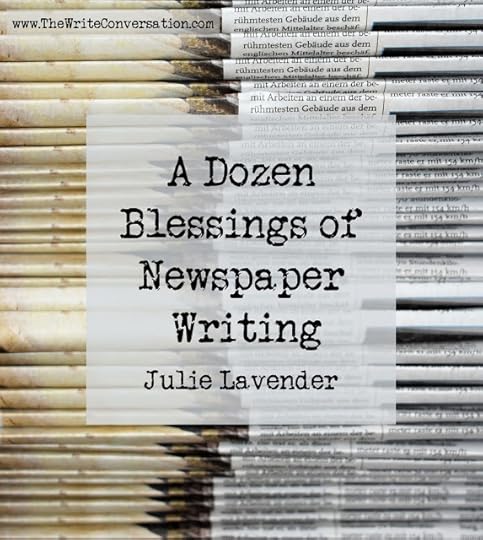
by Julie Lavender @JLavenderWrites
Headlines for the month of November encourage us to count our blessings, an exercise that behooves us twelve months of the year. Occasionally along the writing journey, we’re prone to celebrate and give thanks for the end product – the byline, the print magazine in hand, the final copy of that coveted book.
But there’s much to learn along the way, many opportunities for thanksgiving, blessings just waiting to be acknowledged and celebrated.I’ve shared my love of newspaper writing and tips for getting started as a freelance newspaper stringer over several columns in The Write Conversation. I am honored and blessed to contribute local, faith-based, godly stories in my hometown newspaper, The Statesboro Herald.
Newspapers are rife with current events that aren’t always positive and uplifting. Yet, that’s what most newspapers publish as “important,” national events that need to be shared. But readers want to see stories of inspiration, success, encouragement – “good” news – of folks from their own community and neighborhood.
I’ve amassed a number of blessings from my journey as a freelance stringer, way more blessings than credits thus far. And you can, too.
I love encouraging others to consider adding that title to the writing resume. An online writer friend who lives outside of Atlanta took the challenge. Word Weaver member Ethel Lytton recently sent me this sweet note: “Thank you for the articles you have written about writing for newspapers. I began writing a column for my county newspaper in September. I write about my town’s activities and the surrounding area. This includes the homeschool community.
“Recently, I got to write about a grandchild’s accomplishment! Writing is so fulfilling. THANK YOU FOR YOUR ENCOURAGMENT IN YOUR ARTICLES.”
Her words brought tears to my eyes and were more valuable to me than an above-the-fold newspaper byline! A welcomed, November treat to add to my list of blessings!
Join Ethel Lytton and me in earning stringer credits, and you can assimilate newspaper blessings, too. Check out my list below of by-products from newspaper writing that I’m counting this month as Thanksgiving blessings.
With newspaper writing, I’ve learned to:Tackle “writing tight.”
Hone valuable editing skills.
Accumulate bylines quickly.
Network with fascinating members of the community.
Kickstart platform and name recognition.
Share “little” stores that might otherwise go untold.
Gain experience writing on deadline.
Inspire readers with positive, encouraging, faith-based stories.
Value local stories of God’s work in the community.
Incorporate original articles in other outlets.
Notice and acknowledge community members of faith.
Generate income, albeit minimal, at times.
What about you? Pick an aspect of your writing—blogging, article writing, devotional writing, fiction/non-fiction writing, novel writing, children’s writing, networking, speaking—and join the conversation below. Share what makes you most thankful about that part of your writing journey.
I’ll start with a blessing unrelated to newspaper writing—I’m especially thankful for the fellow writers I get to meet, whether online like my friend Ethel or at conferences or other locations. The camaraderie and encouragement is unparalleled to other acquaintances.
This month, my dear writer friend, Michelle Cox, and I have the blessing of the release of a co-authored, Christmas devotional with BroadStreet Publishing. Come and Behold Him offers readers brief, thought-provoking devotions to keep Christ the focus of the busy holiday season. This book wouldn’t have been possible without the friendship we initiated at a Blue Ridge Mountains Christian Writers Conference and the relationship we’ve shared since then, and for that, I’m forever grateful!
Happy Thanksgiving! “In everything, give thanks…” 1 Thessalonians 5:18 KJV
TWEETABLEA Dozen Blessings of Newspaper Writing - @JLavenderWrites on @EdieMelson (Click to Tweet)
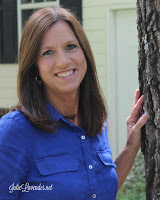 Julie Lavender loves an excuse for a celebration, and the month of November reminds her to count blessings all the way to the Thanksgiving feast with family and friends. She is especially grateful this month for two book blessings: the recent release of Come and Behold Him, a co-authored book with Michelle Cox, prolific author who pens the When God Calls the Heart series, devotional books based on the content of the television show, “When Calls the Heart.” The devotional is available at Amazon, Target, and bookstores. And, the manuscript for her first book with Revell Books, Baker Publishing Group, is due on November 15 to editor Vicki Crumpton, whom Julie first met at Blue Ridge Mountains Christian Writers Conference three years ago.
Julie Lavender loves an excuse for a celebration, and the month of November reminds her to count blessings all the way to the Thanksgiving feast with family and friends. She is especially grateful this month for two book blessings: the recent release of Come and Behold Him, a co-authored book with Michelle Cox, prolific author who pens the When God Calls the Heart series, devotional books based on the content of the television show, “When Calls the Heart.” The devotional is available at Amazon, Target, and bookstores. And, the manuscript for her first book with Revell Books, Baker Publishing Group, is due on November 15 to editor Vicki Crumpton, whom Julie first met at Blue Ridge Mountains Christian Writers Conference three years ago. Besides writing for her local newspaper, Julie contributes to Guideposts Publications, other magazines, a couple of homeschooling blogs, Just18Summers.com, and many compilations. Combining her education degree, love of homeschooling, and joy of celebrating, Julie wrote a devotional entitled, 365 Days of Celebration and Praise, a party planning book called, Creative Sleepovers for Kids, and three teacher resource books for the religious division of Carson-Dellosa. Julie and David are enamored with their four adult children, one son-in-love, and one gorgeous grandson. Keep up with Julie on social media and at her blog at julielavender.blogspot.com.
Published on November 13, 2019 22:00
November 12, 2019
Tips for Writers: What is a Simultaneous Submission?
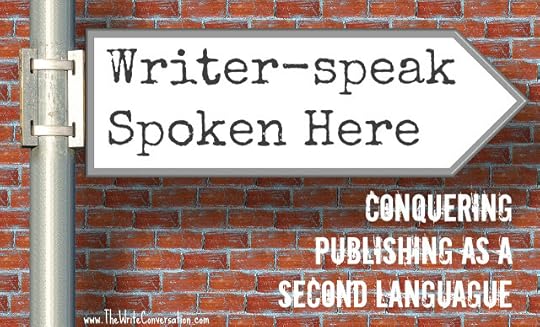 PSL - Publishing as a Second Language
PSL - Publishing as a Second Languageby Linda Gilden @LindaGilden
Simultaneous submission is another writing term that is seemingly self-explanatory, right? Well, yes.
Just send a manuscript simultaneously to several publishers. But there are a few things that will help you understand how the process works.
When I first started submitting books, I was a bit timid to try out the simultaneous submission thing. What if I messed up? What if more than one publisher wanted my book? How would I ever keep track of all the details?
So for a few years I only sent one proposal at a time. If you're familiar with the process, you know that waiting to hear from a publisher about a book proposal can take months. Way back then (as my grandchildren would say) there were no email submissions, only postal submissions in big brown envelopes. Waiting for an answer seemed like forever and it was often more than six months waiting for a reply. So at best, you could probably only send your book proposal to two publishers a year. If I had continued to follow my one-at-a-time plan, my first book would probably be still making the rounds!
It is very simple and safe to submit a proposal to more than one publisher at a time. Publishers actually expect it. The key to doing this successfully is to keep good records so you will know where your manuscripts are at all times. Whether you are still hanging on to an index card file or using a computer-created chart, the important thing is that you have it in a format you can easily read and add to with each communication.
Some of the crucial elements to your record keeping are: Name of manuscript. Date submitted. To whom it was sent – publisher and editor name. Simultaneous or not. Responses from the publisher. For quick reference I include projected word count and whether or not the manuscript is complete. I also like to have a column for other potential markets if none of the originals bring in a contract. Always be sure to record in the response column whether or not your manuscript is going to a committee, has passed a committee, or something else. That way you know when to pray especially for those meetings.
And this is true for full manuscript requests. You may receive multiple requests for a full manuscript at a conference. Again, send them all at once, just let them know it's a simultaneous submission.
For ArticlesI have heard several professional writers say that they send out simultaneous submissions for articles as well as books. Because the response time for articles is usually less for articles, I don’t do this.
Another reason I don’t do this is because record keeping is even more important for article simultaneous submission. And since response time is shorter, there is much greater possibility of missing something. So I would rather be safe. However, in your record keeping chart for articles, I would definitely have a place to record multiple possible markets. That way if you receive a rejection, you are ready to resend your manuscript to another publication.
If you are going to submit to more than one publisher, whether a book or article, be sure to let them know at the time you submit. A simple line at the bottom of your cover or query letter that says, “This is a simultaneous submission,” will do.
What publishing terms have you confused? Be sure to leave your questions in the comments section below. Remember, this is a no-studpid-question zone!
TWEETABLESPublishing as a Second Language - tips on Simultaneous Submissions - @LindaGilden on @EdieMelson (Click to Tweet)
 Linda Gilden is a wife, mother, and grandmother. She finds great joy (and excellent writing material) in time spent with her family. Her favorite activity is floating in a pool with a good book surrounded by splashing children!
Linda Gilden is a wife, mother, and grandmother. She finds great joy (and excellent writing material) in time spent with her family. Her favorite activity is floating in a pool with a good book surrounded by splashing children!To find out more about Linda, her writing, and her ministry, visit www.lindagilden.com . You can also connect with her on Twitter @LindaGilden and Facebook at Author Linda Gilden.
Published on November 12, 2019 22:00
November 11, 2019
When Writing Grows Hard
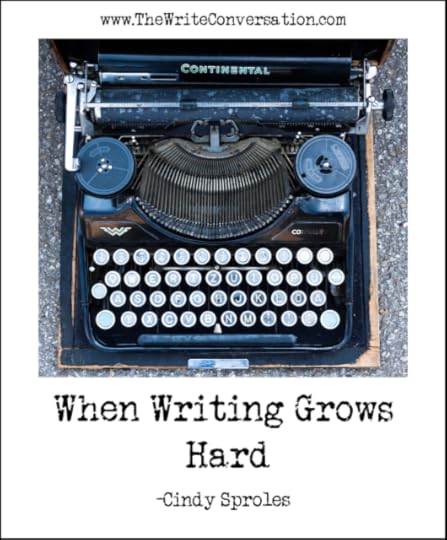
by Cindy Sproles @CindyDevoted
It’s a given that writing is not easy. Learning the craft, the art, of writing is no different than learning the craft of pottery or forging. It must be learned. Practiced. Honed. Folks don’t just pick up a pen one day and write a best-selling novel. Who of us has not experienced that one friend or family member who encourages us to find a profession that is viable? I remember, as a high school senior reporting for my “courtesy senior consultation” with the guidance counselor. Rest assured, I was not a 4.0 gpa’er, but I was a solid 3.3 average student. The guidance counselor saw my high B’s and low A’s as median. So when I showed up for that senior visit, he laid out a long sheet of paper (this was prior to Excel sheets), took his pen, and scribbled a line of numbers, then said. “93.78 average.”
I smiled. “I’m pleased. That’s an A isn’t it?”
“Barely,” he said. “What are your plans when you graduate?”
“I thought I might go to college and take writing.”
“Nope, won’t work. Writers are a dime a dozen and you don’t have the grades for much else. Perhaps you should consider laborer at a one of the plants.”
I slid my chair from the table and walked out of the room. An A wasn’t good enough? The partial idea I had for a career as a writer, faded away. Graduation happened and I went to college where my English teacher assigned us a term paper. I chose to write on The Appalachian Granny Women – Truth or Superstition. I worked hard, turned my paper in and when I received a grade, I wished that high school counselor could have seen it.
A red 99% was circled at the top along with this note. “I have never read a paper that made me want to visit the Appalachians and talk to the people like this one. You have a gift. Consider writing.”
When we choose to be a writer, those who don’t understand the craft tend to be negative. They forget that 80% of all they do requires reading, and those things must be written by someone. Writing is a very viable career. Still it’s hard.
Why so hard? Well, we have to gain our bloody knees—those times where we face rejection. This is what pushes us to improve the work we do. That improvement brings future success. The sad thing is, few are willing to get those knees scrapped up. Many are enthralled with being a writer yet at the same time, are not willing to put forth the effort to see it through to success due to laziness, disappointment, or worse, entitlement.
Though writing is a viable career, it’s not always lined with dollars, so there are times we must weigh our ultimate goals. If your goal is to write as a hobby, that is fine. Write as a hobby, but that doesn’t change the fact one must continue to learn and hone the craft. Should your ultimate goal be to make writing a career, then once again, hone the craft. Seek out magazine articles to supplement your income as you work toward a book contract.
Writing is an amazing career but you cannot allow yourself to fall into the traps that breaks a writer.
Remember, whether you are a gas station attendant or a bank cashier, if you have a dream, with hard work and determination, you can achieve that dream. Still it takes time and practice.
Keep in mind, you don’t know everything. Learning the craft is a years long process. Spend time with folks you can learn from and listen to their guidance and expertise. Sometimes the most important things learned, are learned by sitting at the feet of those who have come before you. Their wisdom and experience are worth a mint.
When naysayers come around, guard your heart and dream. Many times they hide behind the rouse of “trying to help you.” Believe in yourself and hold the course. As naysayers see your small successes grow into larger ones, their attitudes will change.
Pray over your work. Ask the Lord for confidence, wherewithal, and guidance as you work.
Finally, remember that your dream and success as a writer cannot not happen if you never choose to write. You must write.
Writers are a unique bunch. As Christian writers we feel that higher calling. The craft of writing is a satisfaction and joy, but it is hard. When you feel as though everything is against your writing, remember, only you can make the attitude adjustment to forge ahead. Now, put on your work boots and write. You are, after all, a writer. And for the record . . . I believe in you.
TWEETABLE
Encouragement When Writing Grows Hard - @CindyDevoted on @EdieMelson (Click to Tweet)
 Cindy K. Sproles is an author, speaker, and conference teacher. She is the cofounder of ChristianDevotions.us and the executive editor of ChristianDevotions.us and InspireaFire.com. Cindy is the managing editor for Straight Street Books and SonRise Devotionals, both imprints of Lighthouse Publishing of the Carolinas. She is an award-winning and best-selling author and the director of the Asheville Christian Writers Conference. Visit Cindy at
www.cindysproles.com
. @cindydevoted
Cindy K. Sproles is an author, speaker, and conference teacher. She is the cofounder of ChristianDevotions.us and the executive editor of ChristianDevotions.us and InspireaFire.com. Cindy is the managing editor for Straight Street Books and SonRise Devotionals, both imprints of Lighthouse Publishing of the Carolinas. She is an award-winning and best-selling author and the director of the Asheville Christian Writers Conference. Visit Cindy at
www.cindysproles.com
. @cindydevoted
Published on November 11, 2019 22:00



